The south-tipping taper of Hill Road holds some of Bandra’s most historic landmarks and enterprises
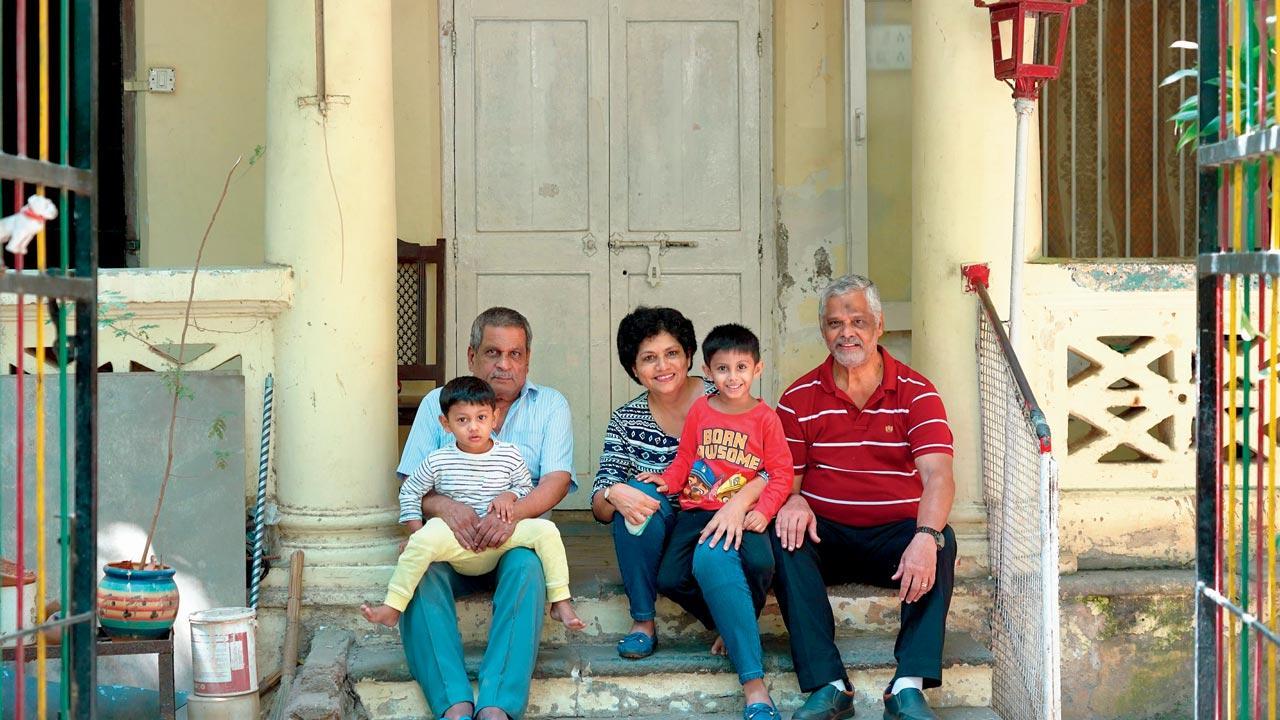
Mark Alexander, Amanda Valladares and Godfrey D’Mello outside 13-A, Rajaram Wadi
 Meet me at Mehboob Studio” is an often-heard plan. And “Mehboob Studio ka raasta” is the usual instruction to rickshaw drivers from commuters riding anywhere near Bandra’s most famous crossroads. Bookmarked north by St Andrew’s Church, this short end of Hill Road holds tales worth telling.
Meet me at Mehboob Studio” is an often-heard plan. And “Mehboob Studio ka raasta” is the usual instruction to rickshaw drivers from commuters riding anywhere near Bandra’s most famous crossroads. Bookmarked north by St Andrew’s Church, this short end of Hill Road holds tales worth telling.
Witness to the cinematic genius of an epic filmmaker, the legendary studio christens Mehboob Khan Chowk. The jewel of this junction’s proximity to plush pads of actors at Band Stand and Pali Hill has rendered the studio a creative hub for 70 years. The sprawling plot, once wooded lush with chickoo, mango, jambul and jackfruit orchards, was where Mehboob Khan, a simple boy from Bilimora in Gujarat, set up this studio in 1954, after announcing Mehboob Productions in 1945.
The man who would be movie mogul had a fascinating ancestry. Star-struck at a tender age, weaned on Hollywood blockbusters like Cecil B DeMille’s in tents pitched on the village ground, Mehboob dreamt big. Not for him to follow the farrier trade of his father Ramzan Khan, a simple blacksmith shoeing the hooves of carriage horses of affluent Parsi villa owners in Gohar Baug. Repeatedly attempting to run away but brought back by his father, Mehboob finally secured a toehold in the city he longed to reach, thanks to a supplier of horses to production houses.
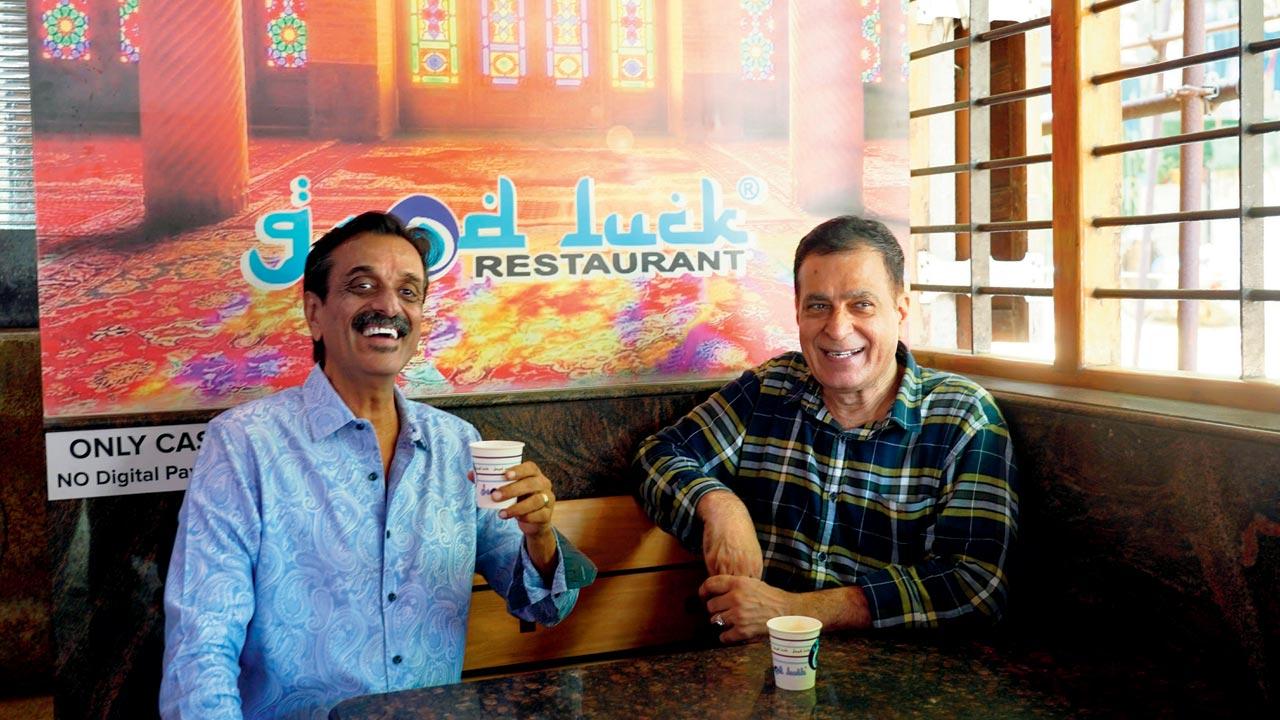 Brian Tellis and Mohammed Hussein Zulphekari in Good Luck Restaurant. Pics/Aditi Haralkar
Brian Tellis and Mohammed Hussein Zulphekari in Good Luck Restaurant. Pics/Aditi Haralkar
“The turning point was meeting Ardeshir Irani of Imperial Films, who was impressed by young Mehboob’s hope and determination. From Imperial to Sagar Movietone to National Studios was his great learning journey,” says a Khan family member. Strategic thinking led him to construct the studio here rather than in a distant suburb. Known to never fire workers, Mehboob Khan stayed true to his humble roots, choosing the hammer and sickle emblem as Mehboob Productions’ logo. “From Aan and Anmol Ghadi to Amar and Mother India, his stature grew steadily. So did it for everyone filming at Mehboob Studio, from Navketan’s Dev Anand and Chetan Anand to Tahir Husain and Nasir Husain. I remember Rajesh Khanna, the biggest phenomenon ever, mobbed by crazed fans on our lawns. Vanity vans hide actors away today. The studio is currently used mainly for ads with celebrities endorsing products–gone are the days of models.”
But movie buffs remember it all. Situated mere feet from the studio, Good Luck Restaurant is where I garner entertaining screen lore Mohammed Hussein Zulphekari has on his fingertips. One of the sons of its founder proprietor Ramzan Ali, he reels (pun unintended) off delightful details of shoots around the studio... The opening scene of Kaamchor with slacker Rakesh Roshan lazing here in the titular role. Rahul Rawail’s Arjun in 1985, showing the water pump building across the cafe as a backdrop and with part of its poster still seen. Dharmendra wooing Tanuja in Do Chor further along the Band Stand seafront. “During those years this corner was a real paradise, full of lovely trees with birds. So relaxing, we didn’t need to go to hill stations like Lonavla,” says Mohammed.
The story of the Zulphekari brothers’ cafe-cum-shop began in Yazd, Iran. Keen to seek his fortune in 1940s Bombay, as a 10-year-old, their father apprenticed at city bakeries, sleeping in gunny bags on the floor. Slowly, he turned a modest chai-coffee joint to this eatery serving finger-licking kheema pav and anda burji.
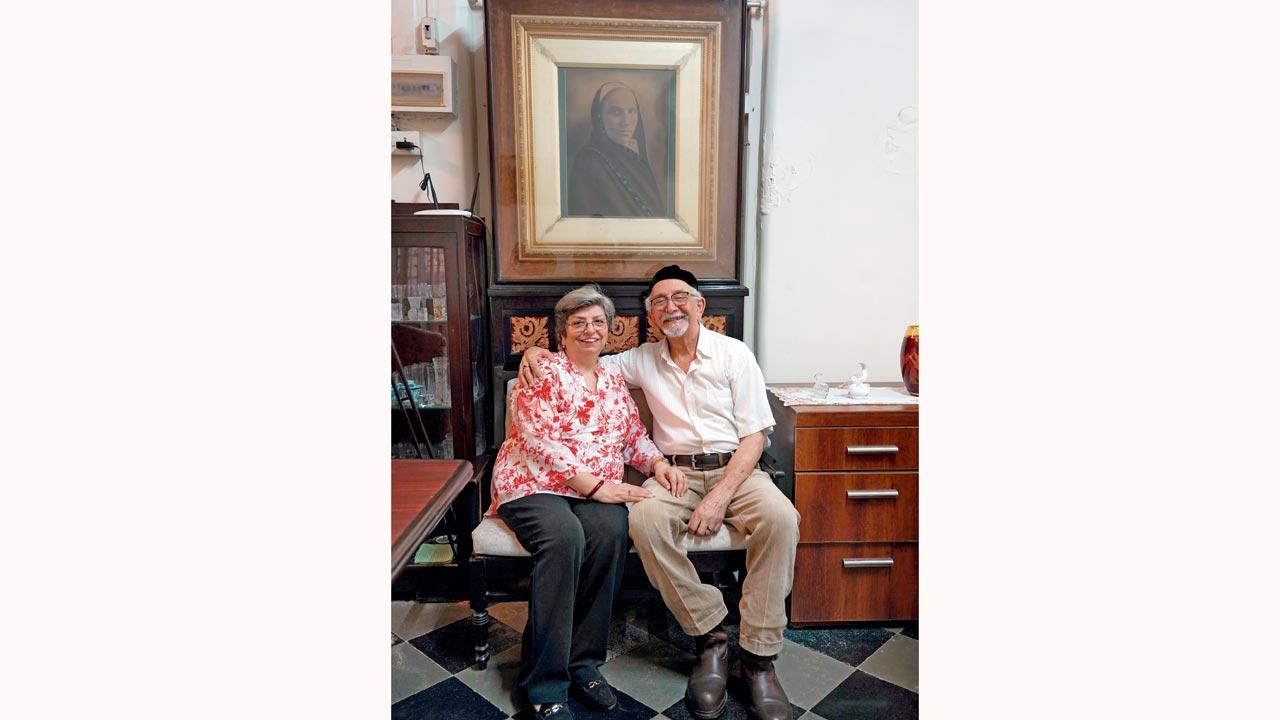 Armaity and Rusi Nariman backgrounded by the charcoal portrait of her great-grandmother Soonamai Kuwarji Makidalal
Armaity and Rusi Nariman backgrounded by the charcoal portrait of her great-grandmother Soonamai Kuwarji Makidalal
I down cups of Good Luck’s refreshing lemon tea with the neighbourhood’s familiar-most face, before we explore his home acre together. Veteran radio jockey and co-founder of Fountainhead Promotions and Events, Brian Tellis greets people at practically every step. His Virendra Colony address, north-ending the road, lies close to Lourdes, his childhood home. “It was attached to Khajur Wadi behind. We kids fed on tasty-as-hell dates, jumping the low wall to land there,” he says.
“I’m glad walls don’t speak. You wouldn’t want to hear about unmentionable mischief certain BMX biker boys got up to! I constantly hung out with co-conspirators in Virendra. We swam at Soldier’s Pond, about a hundred yards off, and wells in the vicinity. Amjad Khan lived opposite Mehboob Studio. His brother Imtiaz wrote the award-winning play, Barbed Wire Blackboard, for the St Andrews Parish Zonals contest, which Amjad directed in 1974, the year before Sholay changed his destiny.”
Strolling through the compound circling Virendra presents charming sights and sounds: cool-clustered imli, coconut and plaintain groves, strains of guitar and piano music wafting from windows, a serene grotto that worshippers gather around at 7 pm daily this month.
 Ashok Chheda at Jalaram Stores
Ashok Chheda at Jalaram Stores
An icon only a hop from Virendra Colony is Damian, furniture makers of repute since 1962 when entrepreneur Damian Pereira established the firm. His sons Frederick, Valentine and Anselm steer forward the legacy. Frederick offers an amazing account of how the company came to be fatefully, if quite obviously, named–“Firstly, though his workshop lay in what was a jungle wilderness then, our father was confident of success, because the premises were located faithfully at the foot of our Lady of the Mount, at Mount Mary’s.”
Thinking of giving the shop a personalised name, Pereira scribbled his own on a piece of paper while travelling on a bus. Suddenly doubtful, he reconsidered the idea. Was Damian not too predictable a name for the enterprise? He chucked the chit from the window. Only to have a strong wind spin it right back at him. He threw it out again. Once more it landed squarely in his lap. By this time, he was convinced a voice was urging: ‘Damian put forth thy name. You shall be remembered for generations to come.’
Famed for what is possibly the most spectacular Xmas window dressing in town, Damian’s exquisitely crafted nativity scene displays attract crowds from across the city–especially families with children–lining the street for weeks leading up to Christmas.
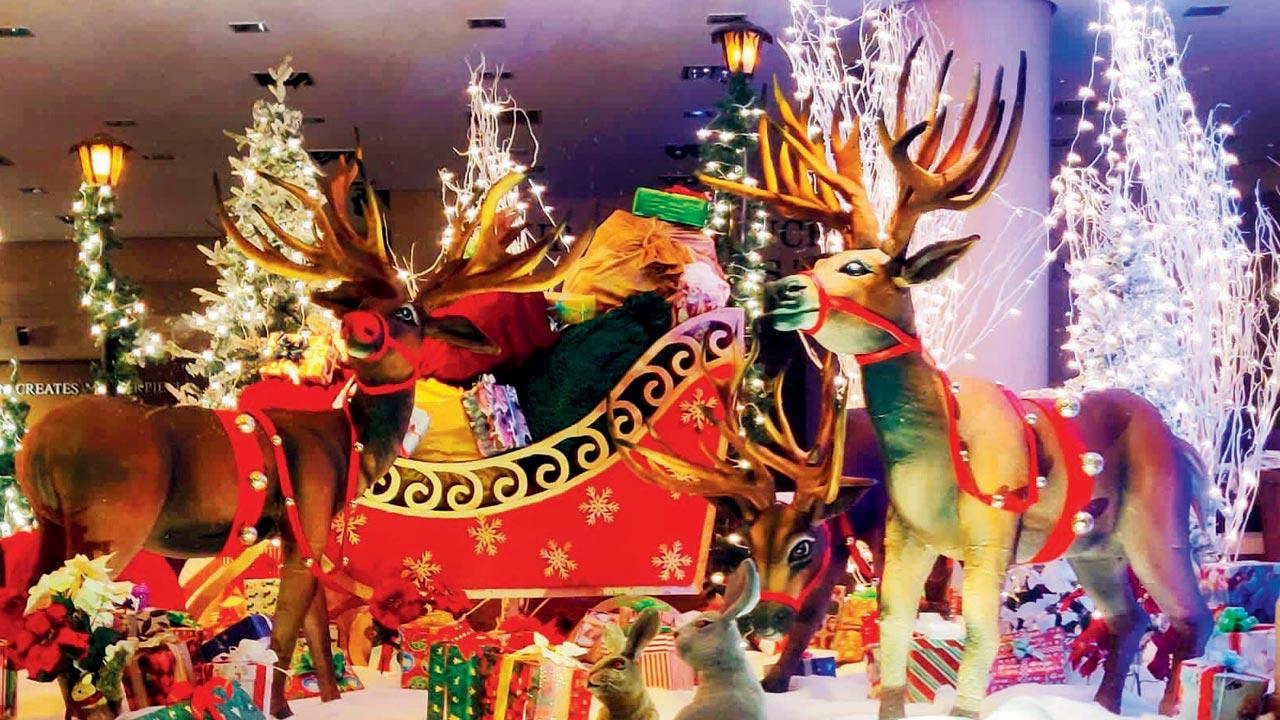 Christmas window dressing at Damian furnishers
Christmas window dressing at Damian furnishers
Opposite this showroom stands century-old Patkar Maternity Home. “Apart from the fact that all of us were born there, we took school friends to see our mum’s babies each time a new one arrived,” laughs Orlinda Sequeira. She and her cousin Amanda Valladares, residing in Ocean View building (earlier the D’Mello bungalow) speak of their remarkable grandmother, Leonara D’Mello. “Widowed at 26 with five children, she became a popular midwife helping women, particularly from wealthy Muslim families, deliver at home,” says Orlinda. “A woman with spunk, she worked hard at the job she was much sought for.”
An oasis of calm amid traffic chaos outside, Rajaram Wadi, abutting Patkar Maternity Home, harbours serene spaces not yet wrecked by towers. In shaded seclusion bask picturesque single-storey structures numbered 11, 11-A, 11-B and 11-C Rajaram Wadi. Orlinda and Amanda share an interesting ancestry with cousins across the garden wall, in 13-A, the Alexanders. Their grandfather, Edward D’Mello, a top-hatted, tail-coated stenographer, among the first such in Bombay, owned land including rice fields near Bandra Talkies at the rate of a rupee per square yard.
On a foliage-fronted porch, Mark Alexander describes the unique, still functioning sports club his brother Sydney started in 1970 to get teenagers off the street. A foreman in the machine shop of Fr Agnel Technical College, Sydney, supported by friends and St Andrew’s High School, started Companeroes, Spanish for “companions”. He coached football and hockey players, dedicating his savings and pension to keep the club going. Its yellow and red brigade vaulted from local laurels to grooming champs storming major football tournaments like the Harwood League and Joaquim Carvalho, who represented India at the 1984 LA Olympics.
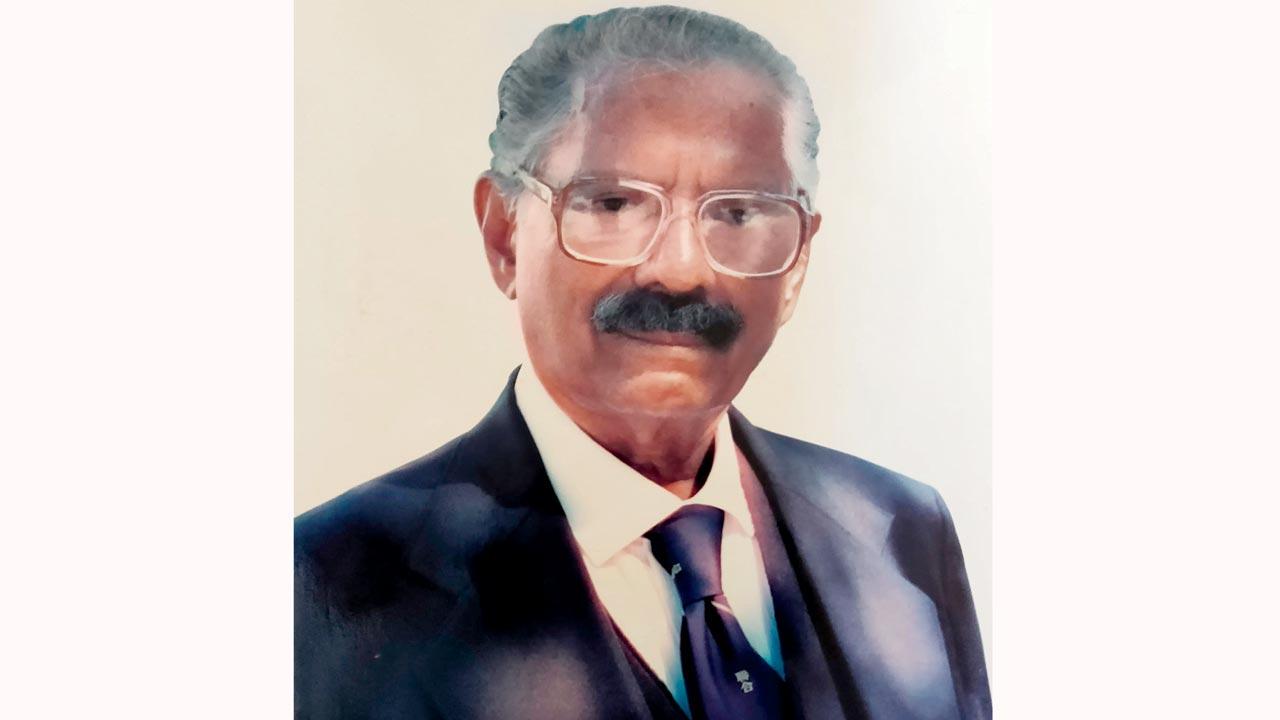 Founder proprietor Damian Pereira
Founder proprietor Damian Pereira
A little further left, retired marine engineer Rusi Nariman and his wife Armaity welcome me in No. 11. When her father, Farrokh Makidalal, came to this property in 1936, his family was told by earlier neighbours of a beautiful fish pond ringed by rose gardens at the spot where their bungalow was later erected. “Even when we came the wadi had a massive mango tree, a pretty drumstick tree, plenty of papaya, pear, pomegranate and sitafal trees, and lime and tulsi bushes. My mother also cultivated black roses.”
Repairing to the dining table warmly laid with mawa cake and batasa biscuits, my eyes catch a strikingly sized charcoal portrait of Soonamai Kuwarji Makidalal, Armaity’s great-grandmother, whose philanthropist cousin Motlibai Wadia’s frame graces an adjacent mantelpiece.
An elderly homemaker buying groceries at Patel Provision Store, formerly a grain shop, agrees, “It’s a green haven gone. With much of the original vegetation disappearing, so has the peace of this place. Instead of bird calls, we hear sirens of ambulances rushing to Lilavati Hospital.”
Watching the road expand wide from a 30-feet path to almost 90 feet in parts, is the change that took getting adjusted to, for Ashok Chheda of Jalaram Stores. Sitting at the counter of the stall his father Padamshi Chheda opened in 1962, he says, “The larger the road got, its community spirit shrank. Luckily, some past associations do remain. With loyal customers and a few walk-ins, I manage to survive online competition. Bhagwan ni daya thi, small shopkeepers like me might be with you for a while.”
Author-publisher Meher Marfatia writes fortnightly on everything that makes her love Mumbai and adore Bombay. You can reach her at meher.marfatia@mid-day.com/www.meher marfatia.com
 Subscribe today by clicking the link and stay updated with the latest news!" Click here!
Subscribe today by clicking the link and stay updated with the latest news!" Click here!








